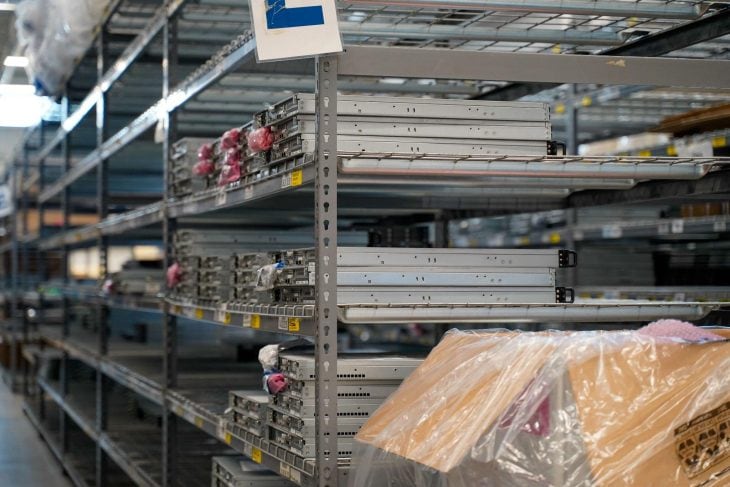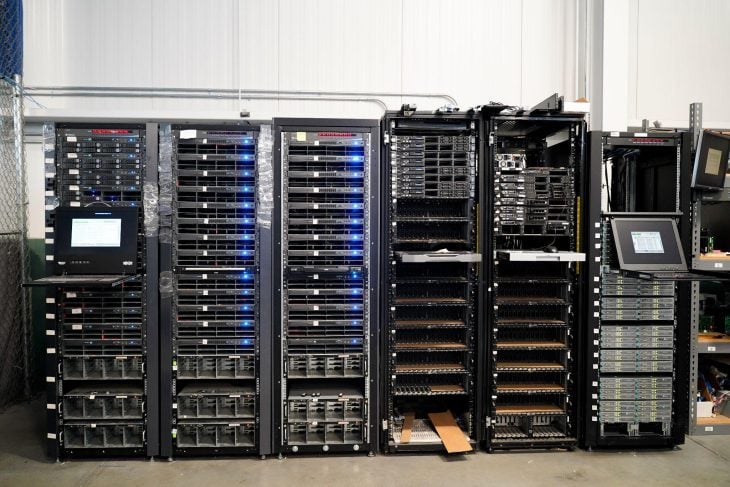How ITAD Service Providers Ensure Data Center Compliance and Security

Data centers handle vast amounts of sensitive data, making compliance with security regulations and proper disposal of IT assets essential. Failing to comply with data protection laws can lead to costly fines, lawsuits, and reputational damage. This post explores how ITAD service providers help data centers stay compliant and secure by offering certified data destruction and maintaining clear audit trails to meet the highest industry standards.
The Importance of Compliance in Data Centers
Data privacy and security have become top concerns for businesses, consumers, and regulators. Europe’s General Data Protection Regulation (GDPR) has raised the bar for organizations around the globe. California’s CCPA has imposed similar standards, while HIPAA, FERPA, GLBA, and other regulations govern the privacy and security of information for specific industries and ecosystems.

Data centers store vast amounts of sensitive information, making compliance with data protection regulations a fundamental priority. Non-compliance can lead to severe penalties, expensive lawsuits, and long-term reputational damage. Data breaches undermine customer trust, leading to lost revenue and competitive disadvantage.
Today’s high-threat environment demands stringent controls to ensure data confidentiality, integrity, and availability. Whenever a data center retires unwanted IT equipment, it must ensure that all data stored on those devices is permanently and irreversibly erased. ITAD service providers play an essential role in helping data centers securely dispose of their outdated IT assets, ensuring compliance with data security and privacy laws.
Certified Data Destruction Methods
Certified data destruction is an essential element of secure IT asset disposition. ITAD service providers offer several methods for ensuring secure data destruction:
Data Wiping: Also known as “secure erasure,” this method involves overwriting storage devices with randomized data, ensuring that any data stored initially on those devices is unrecoverable. This method complies with robust cybersecurity standards such as NIST 800-88. It also allows for the reuse of hard drives, which benefits the environment.
Degaussing: This method uses powerful magnetic fields to erase data from hard drives and magnetic tapes. Although degaussing is valued for many high-security use cases, it does not work for solid-state drives. It also renders affected storage media permanently unusable.
Physical Shredding: Hard-drive shredding breaks devices down into tiny, unrecoverable fragments, which recyclers can then process. Many organizations prefer this method because it offers irrefutable evidence that data has been completely and irrevocably destroyed.
The best ITAD service providers conduct these data destruction processes following globally recognized standards, including those set by the National Institute of Standards and Technology (NIST) and the Department of Defense (DoD), ensuring compliance and peace of mind.
Ensuring Compliance with Industry Regulations
Data centers must comply with a variety of industry-specific regulations, including:
GDPR: Ostensibly, this European regulation applies to the personal data belonging to EU citizens, but in practice, it imposes restrictions that impact the storage and use of personal information around the globe. GDPR has raised the bar for data privacy and security, prompting organizations to step up their data protection practices across the board.
HIPAA: The HIPAA “privacy rule” governs the handling of “protected health information” in the United States. Specifically, it applies to “covered entities” such as healthcare providers, insurance companies, hospitals, and third-party billing companies. By extension, it covers any organization with whom a covered entity shares information, including email services, SaaS-based software companies, and other IT service providers, including data centers.
PCI DSS: This regulation aims to prevent financial fraud and identity theft, governing the secure handling of payment card information.
These regulations apply to every aspect of collecting, storing, and using protected data, including asset disposition. ITAD providers understand these regulations and keep current with pending changes to the law. They have stringent protocols to ensure that every step of the disposition process complies with applicable legal and industry standards.

How ITAD Providers Prevent Data Breaches During Disposition
When IT managers at Morgan Stanley hired a moving company to dispose of some old servers and laptops, they were assured that their data would be destroyed before those devices were sold. Unfortunately, that didn’t happen, and the devices later turned up on an online auction site, with hundreds of thousands of customer records intact. That incident led to over $60 million in fines, multiple lawsuits, and severe reputational damage.
Improper asset disposal poses significant risks of data breaches. A single mishandled hard drive or server could expose sensitive information, leading to devastating financial and reputational consequences.
To prevent such risks, ITAD service providers implement comprehensive security measures, including:
- Secure Chain of Custody: This ensures that assets are tracked and managed at every stage of the disposition process.
- On-site Data Destruction Services: With options for on-site or off-site data destruction, clients can select the method that works best for them. For certain high-security scenarios, on-premises data destruction may be preferred.
- Access Controls and Surveillance: Certified ITAD companies maintain strict access controls for sensitive areas, closely monitoring data destruction processes while preventing unauthorized access to retired devices.
These measures ensure that sensitive data remains protected throughout the entire IT asset disposition process.
Ensuring Accountability
Transparency and accountability are vital for maintaining compliance and security. Leading ITAD service providers offer detailed reporting and supporting audit trails for clear visibility into the disposition process. These reports typically include:
- Certificates of secure data destruction.
- Asset tracking documentation.
- Detailed summaries of compliance with relevant standards.
This documentation helps data centers verify compliance and serves as critical evidence in audits or legal inquiries.
Choosing the Right ITAD Service Provider for Compliance and Security
The best ITAD service providers follow rigid standards and offer full transparency to their clients, backed by leading certification bodies like eStewards. These certifications ensure that providers adhere to strict compliance measures for data security, environmental responsibility, and worker safety.
e-Stewards Certification
NCS Global is e-Stewards certified, meaning our ITAD processes meet the highest global standards for responsible e-waste management and data security. e-Stewards certification ensures:
- Zero landfill and zero export of toxic e-waste to developing countries.
- Strict data security protocols, preventing any risk of data breaches.
- Worker health and safety protections, ensuring ethical and responsible handling of IT assets.
Certification standards ensure that an ITAD provider’s chain-of-custody practices, secure data destruction methods, and physical security measures comply with data security regulations, environmental laws, and industry standards. Look for an ITAD service provider with detailed documentation and audit trails to support your compliance efforts.
Want to learn more about how your data center can meet compliance and security standards? Contact us today to discover how NCS Global’s ITAD services can help.